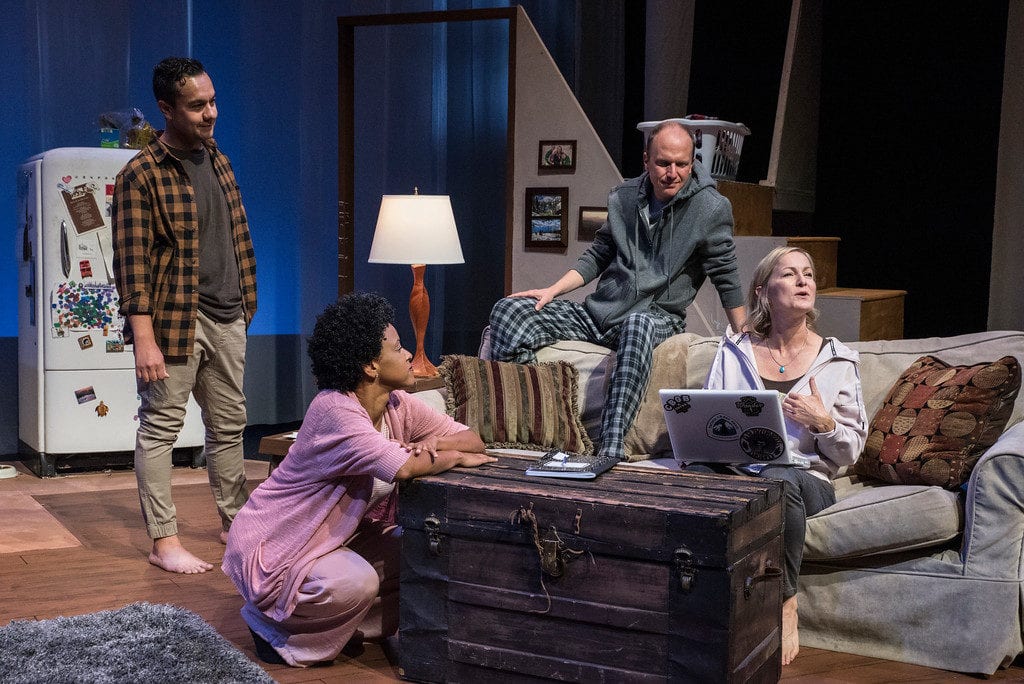by Erica Reid (Read the original.)

Hurray: the 2019-20 theater season has opened!
My first opportunity this season came through Boulder Ensemble Theatre Company (BETC)’s production of Tiny Beautiful Things, a one-act play based on a compilation of essays by author Cheryl Strayed, recounting her interactions with strangers through an advice column she penned. Strayed anonymously contributed to the column Dear Sugar between 2010 and 2012, covering topics from love and sex to death and heartache.
The play introduces us to Sugar (Strayed’s pen name) just as she agrees to take on the job of writing the column. The remaining three actors serve as Letter Writers, a sort of Greek chorus where each actor takes turns shifting their dialects and physicalities to become any number of people seeking Sugar’s advice. The Letter Writers blend and transform as they rapidly announce their questions (“I want to leave my marriage…”, “I’m secretly addicted to pain meds…”, “Kind of crazy, but my girlfriend is seriously turned on by Santa Klaus…”), but each is also given a more substantive moment or two in the spotlight. Josh Hartwell is sweet as a lonely teenage boy; later, Simone St. John tenderly addresses a sexual assault; later still, Rodney Lizcano nearly steals the show as a father who is in mourning for his lost son.
…Nearly steals the show, because at every moment Diana Dresser is in control of the room. Author Cheryl Strayed is known for the “radical honesty” in her writing, and Dresser brings her own radical honesty to her role as Sugar, helping to elevate what is essentially a staged reading of a newspaper column into something compelling and moving. Dresser makes it feel as though the stories are just at that moment occurring to her, that she is delving into her own distant and often difficult memories to summon the advice that she is giving.
Though Sugar never meets the Letter Writers, they do interact. A combination of Nia Vardalos’ adaptation for stage and Rebecca Remaly’s skillful direction keeps the four actors whirling around the same space, almost as though they are sharing one kitchen across space and time. If one pajama-clad Letter Writer stirs the muffin mix, another may later fill the baking cups, only to have Sugar pull the warm muffins from the oven. In this way the intimacy builds despite the distance, mirroring Sugar’s growing bond with her readers as they spend their dark nights of the soul together.
We spend the entirety of Tiny Beautiful Things in Sugar’s living room and kitchen, which suits me fine as it takes 90 minutes to absorb Tina Anderson’s detailed set design. The scuff marks on the bottom of the kitchen island, the few pellets of kibble spilling from the dog bowl, the toy helping to balance a table leg, the growth chart notches on the doorframe — if you told me that Anderson lived on that set for 6 months, I would believe you. We never meet Sugar’s children but I could estimate their ages and their interests from this realistic living space. Kate Bashore’s lighting adds to the effect with subtle shifts to guide the show’s many quick transitions.
Despite the solid production that I expect from BETC, I left feeling slightly short of blown away, which I attribute to the fact that the show has a difficult time ending. This play has no plot — or it has 20-30 plots, as each piece of advice that Sugar gives lands with its own own small but powerful resolution. The result is a play that provides its satisfaction cumulatively — a little here, a lot there — but without a single satisfying conclusion to make you leap up from your seat. If you go in expecting 90 minutes of well-crafted poems instead of a package with a single tidy bow, you will love BETC’s Tiny Beautiful Things.
